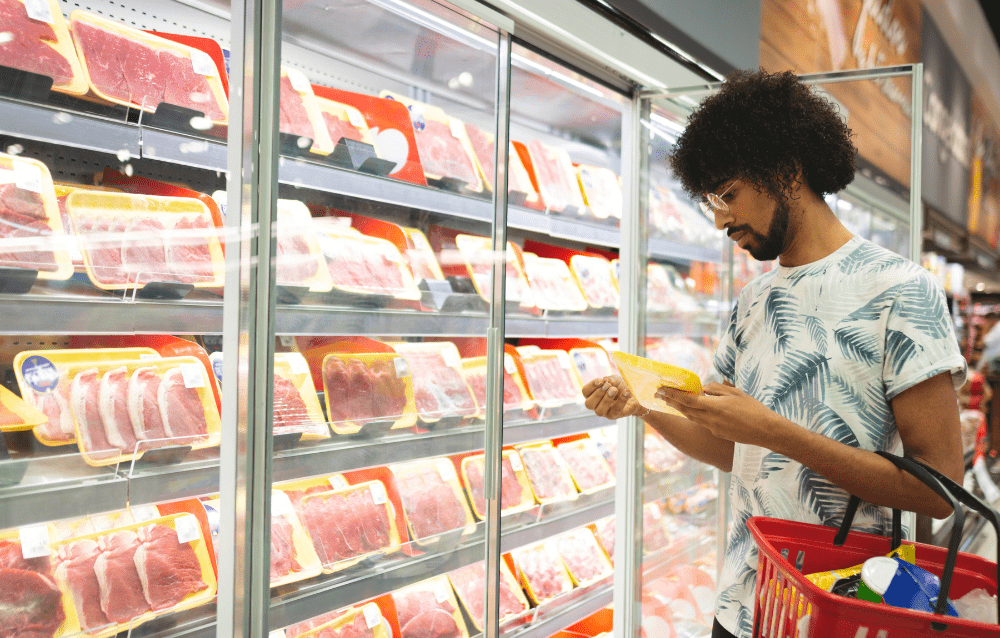Transforming the Retail Meat Aisle for Sustainable Success
Trends
November 15, 2023Reading time: 2 minutes
In today's retail landscape, the meat aisle presents several challenges for retailers. The rise of private label sales coupled with consumers' growing concern for sustainability, has retailers seeking innovative solutions.
Read on to explore the pressing issues faced by retailers and how packaging can help overcome these challenges in the meat aisle.
In today's retail landscape, the meat aisle presents several challenges for retailers. The rise of private label sales coupled with consumers' growing concern for sustainability, has retailers seeking innovative solutions.
Read on to explore the pressing issues faced by retailers and how packaging can help overcome these challenges in the meat aisle.

Private label proliferation
Private label products are gaining momentum across markets. In Europe today, 70% of consumers frequently purchase private label items as part of their regular grocery shopping, with 10% being dedicated private label loyalists. Rising inflationary pressures have led consumers to prioritize "Price" as the top reason for choosing private label products.
While "Price" is the top reason, 28% of grocery shoppers have indicated that more sustainable packaging plays a role in their purchasing decisions.
Consumers believe that retailers are moving toward sustainability, but they desire more significant efforts in "Food waste reduction," "Less excessive packaging," and "More sustainable packaging."
Food waste reduction for meat and fish
Food waste is a significant concern for retailers and consumers, particularly in the meat aisle, where products have a limited shelf life.
Amcor's SkinTite "second skin film" enhances product presentation and significantly extends the shelf life of meat products. With our SkinTite VSP (vacuum sealed packaging, brands and retailers can easily gain 4-6 days more shelf life compared to MAP (modified atmosphere packaging). For example, if normal shelf life is 8-10 days, VSP offers 14-16.
The ability to be displayed on supermarket shelves for more than two weeks is a huge advantage and SkinTite's smooth presentation removes the “ick” factor some shoppers can have when selecting fresh meat.
By increasing the time products remain fresh, retailers can reduce food waste, a key concern for consumers. This extension of shelf life also contributes to cost savings by lowering the frequency of restocking and reducing the amount of meat products discarded due to spoilage.
Less packaging
The traditional use of tray and lidding packaging, especially in the case of minced meat, uses a significant amount of plastic. Additionally, such packaging can be rigid and heavy, making it less sustainable and less cost-effective for retailers.
Retailers can significantly reduce their amount of plastic by moving away from traditional tray + lidding packaging towards flow packs and thermoforming films.
Amcor's PrimeSeal™ Recycle-Ready Thermoforming Film and our PrimeSeal™ Recycle Ready Flowpacks offer a more sustainable alternative.
Both solutions are lighter and use significantly less plastic, thus reducing the environmental impact and plastic waste. For example switching to recycle-ready thermoforming films will allow 63% plastic reduction vs MAP that uses a rigid preformed tray + lidding film.
These solutions are also certified as recyclable, making it easier for consumers to dispose of packaging responsibly. Moreover, the reduced weight can lead to cost savings in transportation and handling.
More sustainable packaging options for meat
Consumers are increasingly prioritizing sustainability, and they have a growing preference for packaging that aligns with their eco-conscious values. In their eyes, paper packaging is viewed as a more sustainable choice, and gives a more natural and artisanal look to the product.
We recognize the shift in consumer preferences towards paper-based packaging and offer an ideal response with PrimeSeal Packpyrus Paper-Based Web.
This solution caters to the retailer's needs for more sustainable solutions and aligns perfectly with consumers' desire for more alternatives to plastic. Packpyrus is a paper-based packaging with up to 85% fibers, completely eliminateing the need for traditional plastic trays.
Additionally, its humidity-resistant properties ensure that the product remains in optimal condition, enhancing the overall shopping experience and satisfaction for consumers who seek both quality and sustainability.
As consumers increasingly opt for private label products and prioritize sustainability, Amcor is leading the way in extending shelf life, reducing plastic use, and embracing more sustainable alternatives. Through our meat packaging solutions, retailers can meet consumer preferences while fostering a more sustainable meat aisle, benefiting both businesses and the environment.
Want to know more?
If you’d like to make the switch to more sustainable meat packaging, speak to a member of our team. Our experts will be right by your side during the whole process.
Related Insights
4 reasons to choose Second Skin packaging for meat and fish
August 3, 2021
Discover 4 key advantages of second skin meat packaging compared to modified atmosphere packaging (MAP) and how your product can better attract meat and seafood shoppers.
Discover 4 key advantages of second skin meat packaging compared to modified atmosphere packaging (MAP) and how your product can better attract meat and seafood shoppers.
Say goodbye to punctures and leaks with highly resistant, PVdC-free shrink bags for meat and cheese
November 2, 2022
Amcor PrimeSeal™ and DairySeal™ Crystal Shield shrink bags are specifically designed to be a bone guard for bone-in, heavy rub or high abuse products like fresh meats, cooked/processed meats, and hard cheese.
Amcor PrimeSeal™ and DairySeal™ Crystal Shield shrink bags are specifically designed to be a bone guard for bone-in, heavy rub or high abuse products like fresh meats, cooked/processed meats, and hard cheese.
New recycle-ready forming films for meat, fish & cheese, with 80% carbon footprint reduction
February 8, 2023
A new recycle-ready thermoforming film offers meat and dairy brands excellent packaging performance and improved circularity of packaging.
A new recycle-ready thermoforming film offers meat and dairy brands excellent packaging performance and improved circularity of packaging.
